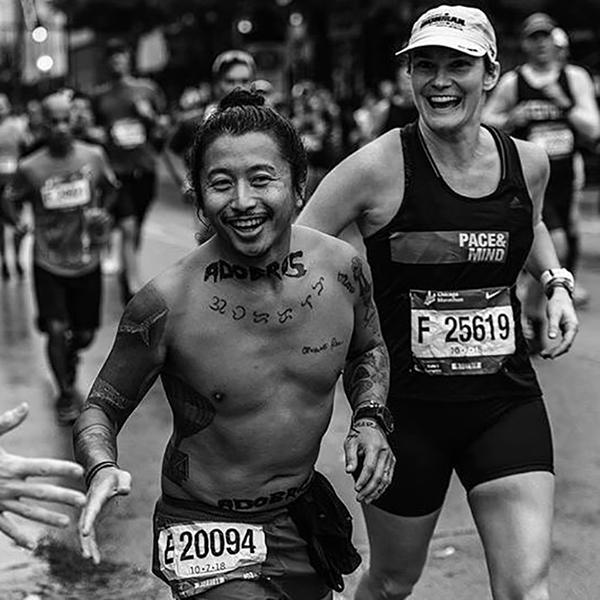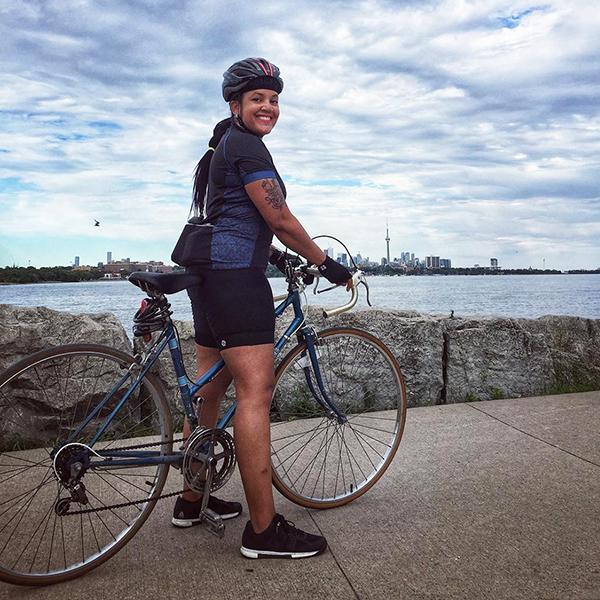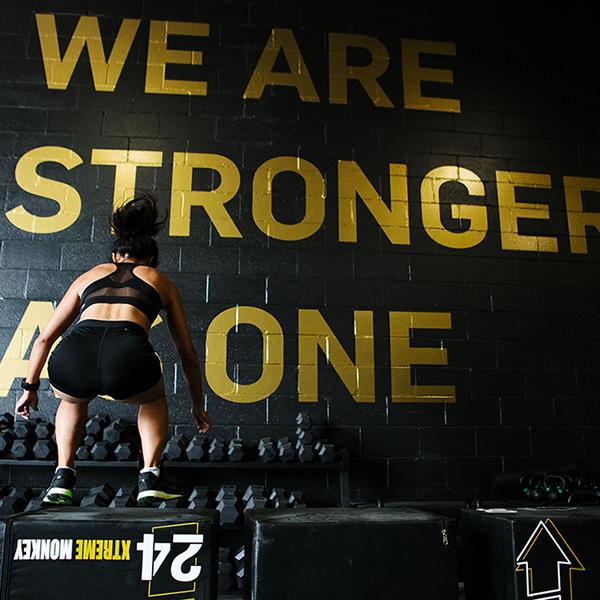Racing season is upon us, and if you’re feeling the pre–marathon jitters—especially if you’re running 42.2k for the very first time—we’ve got you covered. We asked a few of our favourite runners to answer some of the most common questions. Read on for their wisdom on everything from prepping your mental game to flexing for your race photos.
Do you have a burning question we missed? Join FLEETSTREET on Facebook and ask us anything.
I always start the race too fast. Any tips on reining it in and pacing more wisely?
Alex Hutchinson, author of Endure: Mind, Body, and the Curiously Elastic Limits of Human Performance:
“As those old G.I. Joe PSAs used to say, ‘Knowing is half the battle.’ Just keep this thought in your mind as you wait for the start: no one wins in the first half of the race, but plenty of people lose. Based on your training, you should have a pretty good sense of what sort of pace is sustainable, so hold yourself to no faster than that pace by checking your splits. Sure, you might feel great in those early miles, but don’t change the plan. If you really are having a once-in-a-lifetime great day, you’ll have plenty of time to speed ahead of schedule in the second half of the race—like Eliud Kipchoge did in setting his marathon world record last month.”
This is going to be all over my Instagram. How can I make sure I look awesome in my race pics?
Chris deKoning, assistant director of the Scotiabank Toronto Waterfront Marathon Broadcast:
“This is my number one rule in marathons: always have an amazing photo. No one cares about your time as much as you care about vainly posting a self-portrait hulking up, flexing like a shaved bear. Be aware of your friends and the photographers on the course. Scream ‘iPhones up!’ if they don’t spot you. Get closer to them so people in front of you don’t think the photo is for them.”
“The second method to this madness is the stride. Marathon strides are usually small and skippy. Over-stride, make it look good. Even slow down. You need all the screen time you can get. Remember the faces behind the phones, because you better hassle them to AirDrop the photos after. Also, don’t post them all at once. Save some for the off-season days when you’re on the couch with a bucket of ice cream trying to get yourself motivated. Filter, brighten, enhance contrast, add a little saturation for the pale ones, and voilà!”
I’m sick/injured and I’m supposed to race on Sunday. What should I do?
Brittany Moran, Nike Running Toronto coach and chiropractor at The Runner’s Academy:
“When you’re sick, your body is using its resources to try to get you better, so you have less capacity to give it your all in a race. If you do choose to do it, allow yourself to run by feel and listen to your body. If you’re exhausted, vomiting or severely congested, I would not suggest toeing the line.”
“If you’re injured, an easy test to see if you should run is jumping on a single leg for one minute. If you can’t do that, it’s probably not a good idea to run, because running is basically jumping from one foot to the other. But even if you can do it, that doesn’t guarantee you’re good to go.
“The intensity of your pain can also be an indicator: if it’s a 6-10 out of 10, it’s not advised for you to run. Get assessed by a health practitioner for how to proceed. This is a difficult decision—trust me, I know all too well—but remember your training is not wasted. Your body doesn’t forget all your hard work just because you didn’t race.”
What should I eat on marathon morning?
Krista DuChene, registered dietitian and Canada’s second-fastest woman marathoner in history (the upcoming Scotiabank Toronto Waterfront Marathon will be her 16th marathon):
“Avoid anything new. Eat your normal pre–long run breakfast. Keep it simple. Choose low-fibre, low-fat—for example, a plain bagel or toast with honey or jam.”
I slacked off all season and now I’m going into the marathon undertrained. How can I avoid disaster on the course?
Rejean Chiasson, head coach and founder of Pace & Mind and run coach at One Academy:
“First, adjust your goal and expectations. Depending on your experience level, this might mean slowing down by five to 15 minutes, or for newer runners, this could mean not having a goal time at all. Even if your goal is only to complete the distance, I still recommend having a game plan. Will you run with a pacer, following a ‘run 10 minutes/walk one minute’ structure? What will your fuelling strategy look like? Use this race as motivation to make the changes needed to go into your next race better prepared.”
What mental tricks will work if I hit the wall at 30k?
Alex Hutchinson, author of Endure: Mind, Body, and the Curiously Elastic Limits of Human Performance:
“I’d suggest preparing some specific mental phrases—mantras, I guess you could call them—to draw on during the last 12k. One thing that won’t work is imagining it’s going to be easy and you’re going to feel wonderful. So saying ‘I feel amazing’ to yourself isn’t going to ring true, because you’re going to be suffering. Instead, perhaps focus on all the work you’ve done to prepare for this moment, and how proud you’ll be when you reach the finish line having maxed out your abilities on that day. Remind yourself that this is what you’ve trained for, that you’re capable of pushing through the bad patches—and that it will end soon!”
How old is too old of a shoe to race in?
Brittany Moran, Nike Running Toronto Coach & Chiropractor at The Runner’s Academy:
“Typically running shoes last 500–800k, depending on how often you wear them. Ideally when you start your training cycle, take into account how long your current running shoes will last, so you can plan to add in another pair before race day if needed. That said, you do not want to wear a pair of shoes for the first time on race day; you do not want to risk any abnormal rubbing or potential blisters. So as long as you were able to get a good distance run in the new shoes, they should be fine.”
If my stomach feels really terrible on race morning, is there anything I can do to prevent a porta-emergency?
Krista DuChene, registered dietitian and Canada’s second-fastest woman marathoner in history:
“Drink some water and make a few trips to the washroom. If your stomach is upset, hopefully it’s just nerves and will pass. If you need to, use the porta-potty on the course—that’s why they’re there! And don’t worry, it happens to the best of us.”
If things go really badly in a race, how can I tell if I should keep pushing—or stop?
Rejean Chiasson, head coach and founder of Pace & Mind and run coach at One Academy:
“When racing any distance, a certain amount of discomfort is normal and you can usually run through it without hurting yourself or risking an injury. If you’re feeling a dull ache and it’s not getting worse, or slowing down slightly makes it feel better, you should be okay to complete your race. But if you feel a sharp/stabbing pain, slow down to see if it helps—if not, walk to the nearest aid station.
“Especially if you’re a bit more experienced and going into your race with a very specific time goal, stopping early enough could make it possible for you to recover and try again in a few weeks. This could be the right decision, especially if you’re battling GI issues or a cold/flu.
“But if you’re racing with the main goal of completing the distance, then slow down, smile, enjoy the experience, and focus on getting to the finish line.”
This is my first marathon. Be blunt: how much will this hurt?
Chris deKoning, assistant director of the Scotiabank Toronto Waterfront Marathon Broadcast:
“It’s going to hurt in ways you’ve never hurt before. The things that normally bothered you in training will disappear. But something new may cramp. Your foot may suddenly blister. GI issues may happen. It can get pretty dark out there, and you will question many things about life.
“Around 32–37k in the Scotiabank Marathon, you’ll see the CN Tower from Lakeshore and it will feel like it’s forever away. Everyone around you may be zombies, but as you come back into the city, you will be brought back to life. This race is the most memorable finish I’ve ever had. It was my first and it was pretty epic. A few moments after the finish line, you will hurt again, but the medal will be worth it all.”



